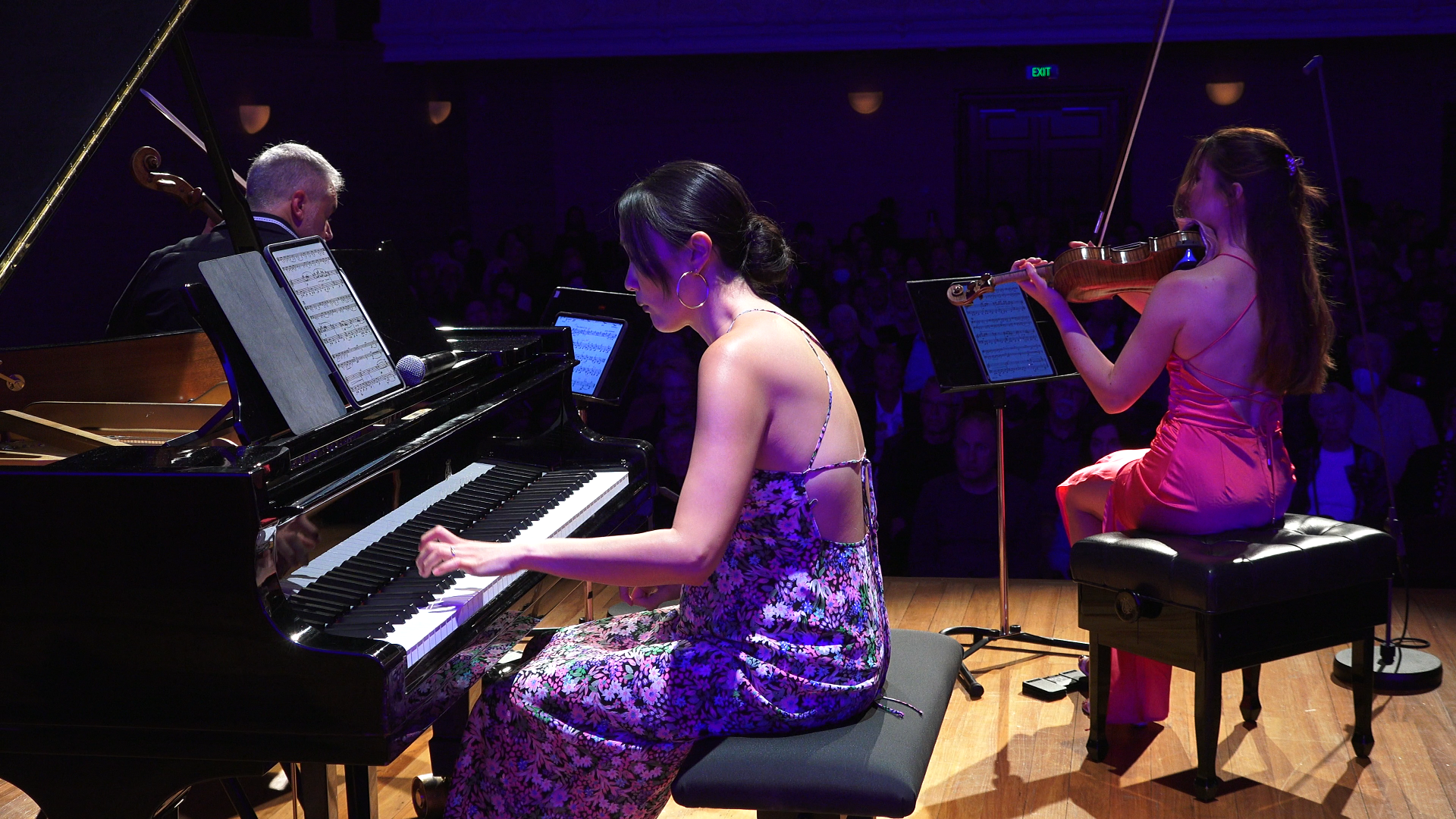Wellington Moon Festival
16sep7:30 pmWellington Moon FestivalFa 发 : NZTrio and Xia Jing (guzheng)
Event Details
Fa 发 Programme: Zhou Long (China/USA): Spirit of Chimes Xia Jing (China): Solo Guzheng Dorothy Ker (NZ): String Taxonomy (world premiere) Jeroen Speak (NZ): Serendipity fields (world premiere) Dylan Lardelli (NZ): Shells (world
Event Details
Fa 发 Programme:
Zhou Long (China/USA): Spirit of Chimes
Xia Jing (China): Solo Guzheng
Dorothy Ker (NZ): String Taxonomy (world premiere)
Jeroen Speak (NZ): Serendipity fields (world premiere)
Dylan Lardelli (NZ): Shells (world premiere)
Gao Ping (China/NZ): Feng Zheng (Kite) (NZTrio commission and world premiere)
Renowned guzheng soloist Xia Jing 夏菁 accompanies NZTrio in Gao Ping’s world premiere of his new work Feng Zheng (Kite) dedicated to his dear friend the late, great NZ composer Jack Body. Feng Zheng is inspired by the notion of sending thoughts and wishes into the sky – a perfect way to celebrate the coinciding Harvest Moon Festival. Three other new commissions by New Zealand composers Dylan Lardelli, Jeroen Speak, and Dorothy Ker have also been created for this unique instrumental combination of piano, cello, violin and guzheng. The concert is sponsored by the China Culture Centre in New Zealand and is part of the official Chinese Ministry of Culture 2016 Moon Festival celebrations.
天涯共此时 (A moment shared, though far apart)
Supported by Confucius Institute, Asia New Zealand Foundation, Te Kōkī New Zealand School of Music
BOOKING INFO
General Admission: $25 – BOOK NOW
THIS PERFORMANCE IS NOW SOLD OUT!
Time
September 16, 2016 7:30 pm(GMT+00:00)
Location
Adam Concert Room, Victoria University
Organizer
Programme Notes
Zhou Long (China/USA): Spirit of Chimes (2003)
Zhou Long is a Chinese/American composer, of mostly orchestral, chamber and vocal works that have been performed throughout the world. Among his honours are a Grammy Award (1999) for the recording on Teldec of Words of the Sun, the Academy Award in Music for lifetime achievement from the American Academy of Arts and Letters (2003), and the Pulitzer Prize for Music (2011) for Madame White Snake. He has also received fellowships from the American Academy of Arts and Letters, the Guggenheim Foundation and the Rockefeller Foundation.
Zhou Long writes: ‘Spirit of Chimes was inspired by the sounds of chimestones, bonewhistle, and chimebells from ancient China. Although early Chinese music before the Tang Dynasty has disappeared, the real sound of ancient instruments could still bring me imaginations. I translated the real sound and my impression into the piano trio and hope my music can give a new life to the ancient chimes.’
Xia Jing (China): solo guzheng
Ms. Xia Jing is a talented young guzheng performer from the China Conservatory of Music in Beijing. (The guzheng is a plucked zither with 18 or more strings and moveable bridges; ancestor of the Japanese koto). Ms. Xia is a Gold Medal winner of the “World Rising Star” competition in China. She won the Bronze Medal in the guzheng competition of the “Golden Bell Award,” which is the highest accolade for Chinese musical performance. In collaboration with the China Symphony Orchestra, she was invited to attend the Vienna New Year’s Concert. She has also been invited to numerous music festivals and has presented many solo performances in the U.S., New Zealand, Switzerland, Malaysia, South Korea and other countries. Ms. Xia is also an accomplished player of other ancient Chinese stringed instruments, including the guqin (seven-stringed zither) and se (also a plucked zither, but much rarer than the guzheng today). Ms. Xia currently teaches guzheng at the Confucius Institute, University of Arizona.
Dorothy Ker (NZ): String Taxonomy
Dorothy Ker was born in Carterton and studied at Auckland University in the early 1980s. She departed to the UK in 1992, where she studied with Nicola Lefanu and Harrison Birtwistle, completing a PhD at York University in 1998. Her studies were followed by research fellowships at Reading University (2001-2004) and Sheffield University (2005-2010), where she is currently Senior Lecturer in Composition and Director of Research in the Department of Music. Her solo CD diffracted terrains: Chamber Music of Dorothy Ker was released to critical acclaim by the London-based ensemble Lontano in 2007. Her output includes a number of collaborations with leading contemporary music soloists, including […and1…] for clarinettist Andrew Sparling, Clepsydra composed in collaboration with Christopher Redgate for the new Redgate-Howarth oboe in 2011-12, Rare Earth (2014) for cellist Lucas Fels and Severine Ballon, Ulam’s Spiral for Stephen Altoft and Tactus (2015) for Dylan Lardelli. Her piano trio Onaia was co-commissioned by NZTrio and Fidelio Trio in 2015. In 2013-2015 Dorothy was a Visiting Scholar at Victoria University and lived in the Lilburn House. She was a keynote speaker at the Composing Now conference in 2014 and was the CANZ Trust Fund awardee in 2015.
Of String Taxonomy 1, Dorothy writes: ‘A sonic alchemy amongst the four instruments emerges through shared gestures, so that bowing, plucking, striking and bending are no longer what distinguishes them. Research for the piece has taken place in collaboration with Dr Shu Jiang, a guzheng player based at Sheffield University.’
Jeroen Speak (NZ): Serendipity fields
London-based Jeroen Speak studied composition with Michael Finnissy and Jonathan Harvey at the University of Sussex where he completed a PhD in 2003. The recipient of numerous national and international awards, Including the Irino prize (1998) and the Yoshiro Irino Memorial Prize (1992), Speak has been featured and commissioned by many international festivals, including; Gaudeamus, the Huddersfield Festival (UK), ISCM World Music Days, Darmstadt, and several AC Festivals. He has been broadcast and performed worldwide, and has worked with some of today’s most exciting musicians from around the globe. In 2013-14 Jeroen was the Jack C Richards Composer in Residence at the New Zealand School of Music.
Jeroen writes: ‘This work is, at its heart a reworking of several earlier works, though recomposed for this new ensemble. The guzheng (and its ancient predecessor gu qin) have interested me for some time, ever since my first visits to China, and many works from this period use ideas generated from the instrument, most notably the traditional notation system (wen zi pu) which was used as early as the 10th century. My title alludes to the many overlaps between the guzheng and the first works I composed, particularly on the gestural level, which enable these instruments to work together (I hope) seamlessly.’
Dylan Lardelli (NZ): Shells
Born in Wellington New Zealand, Dylan holds degrees in Guitar Performance and Composition from Victoria University, Wellington. He has studied with Stefano Bellon in Venice and held a DAAD stipend to work with Dieter Mack at the Lübeck Musikhochshule in Germany.
Dylan has been the recipient of many scholarships and awards including the award of first place with his piece Four Fragments in the Asian Composers League Young Composers’ Competition in Tokyo. Dylan’s music has been performed throughout Europe, Asia and North America and by such musicians as Lucas Vis, Tosiya Suzuki, New Zealand Symphony Orchestra, NZTrio and members of Ensemble Modern and Musik Fabrik. His pieces have been programmed in the Gaudeamus music week held in Amsterdam and the Darmstadt New Music Festival. Recently he was an artist in residence at the Tokyo Wonder Site.
Gao Ping (China/NZ): Feng Zheng (kite)
i. Still Clouds
ii. The Breeze
iii. Breaking the Air
iv. Broken Line
The ancient Chinese invented the Kite. Being made of paper and resembling the shape of a hawk, it was originally called “the paper hawk”. It is a popular outdoor pastime in China, seen also as a form of exercise. But there is another pleasure in flying a kite that Gao Ping claims has been ‘lost in the modern time’: the sounds it makes in the air. In ancient times, a bamboo tube was attached to the tail of the kite which made a Zheng-like sound when wind passed through it. Hence the name Feng Zheng (wind harp) a term that is commonly used now.
Kites also used to be flown during the Qingming festival to pay respect to one’s deceased family members and their ancestors – acting as the carrier of their best wishes to the dead. The spiritual yearning in addition to the rigorous physical activeness gives kite- flying a feeling of tenderness that is also robust and healthy.
Gao Ping writes: ‘My “Wind Zheng” is dedicated to a dear friend who is no longer with us, Jack Body, the great New Zealand composer. I have entrusted my emotions for Jack to the wings and sounds of the kite. A motive made of Jack’s name (jACk BoDy)) appears in the beginning and the end of the piece.
I have a friend who used to be mad about making and flying kites. He used to write as many names of his friends as he can remember all over a kite. When the kite reaches greatest height, he cuts off the line and let the kite drift freely. On occasion, a person would pick up his kite and recognise his or her own name on it in great amazement! In fact, the idea for the last movement “Broken Line” came straight out of this anecdote. Is it possible that Jack would meet my free drifting kite somewhere?
Gao Ping is a composer-pianist, born in Chengdu, Sichuan province of China. He studied in the USA in the 1990’s. In demand as a composer, he has received commissions and performances from musicians around the world. Many prestigious venues have presented his work such as the Aspen Music Festival, Dresdener Musikfestspiele, Hibiki Hall Festival (Japan), New Zealand International Arts Festival (Wellington), and the Beijing-Modern International Music Festival.
As a pianist, Gao Ping’s repertoire is extensive; he has performed to acclaim all over the world. In 2008, Gao Ping premiered his Piano Concerto with the New Zealand Symphony Orchestra under the baton of Mr. Kenneth Young. The Listener enthusiastically acclaimed the two-movement work as “a major concerto”. Gao is currently a Professor in Composition at the Conservatory of Music-Capital Normal University as well as a guest professor at the China Conservatory of Music. He previously taught at the Canterbury University in New Zealand.


